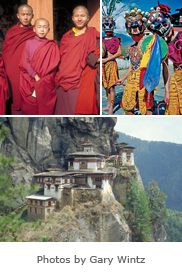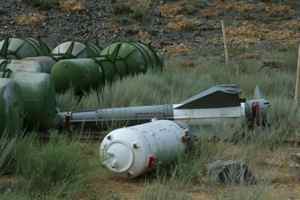
Scud missiles in a minefield
Mayne ast!! Mayne ast!!!
And Bermudian Robert Zuill found himself swamped in the minefields of Afghanistan.
He got himself out of the minefield, obviously, and managed to sit down with me for a Q& A.
Why was he there? Good question. He’s not in the military and he’s not a journalist.
He wasn’t a tourist and he didn’t sneak in. Nope this intrepid Bermudian managed to join a team of solar-powered engineers trying to help. He took some time to recount stories of his six weeks in the visitor, closed country and explain how he’s trying to help (hint: it includes water for kids). Here is the extended Q&A with Robert Zuill.
Q:Why were you in Afghanistan?
A: I was working in New Zealand doing environmental videos for a client in the USA. A newspaper article I read covered a Timaru, New Zealand firm called Sustainable Energy Services Afghanistan. The firm was building renewable energy systems in Afghanistan. I contacted them to see if they had any video of their projects that I could use for a story. They said, “Sure. And if you want to go to Afghanistan, we can arrange that too.” One month later I landed at the Kabul airport.
Q: You said you had to visit various sites. How did you travel and with whom?
A: Mostly I traveled with my driver and interpreter, Shuja. Shuja was born the day the Russians invaded back in 1980 and has survived many a close shave with bombs and bullets. He is also one of the craziest drivers in Kabul. He thought nothing of going the wrong way around the roundabouts if it would save time. Pedestrians he treated with contempt and always seemed to try to run them over. But he was a skillful driver and spoke very good English. He didn’t seem to be afraid of anything and we were soon good friends.
His car was an old Toyota with no armour. Not having armour seemed better because we attracted little attention outside yelled curses and threats from pedestrians and other drivers.
Q: What was the security like there and were you ever worried about your safety besides the run-in with a minefield?
A: In Afghanistan, any failure to respect local sensitivities can get you in serious trouble very quickly. But the image of the Afghan as a bloodthirsty warrior is entirely wrong. For the most part, Afghans are a calm and friendly people. They are tremendously proud to be Afghans, very open to visitors, and love a good joke.
One night I was awakened by thunder at about an hour before the call to prayer. It seemed strange because there had been no rain for weeks. What it really was slowly dawned on me. The Taliban were indiscriminately rocketing Kabul from some of the high hills around the city. The firing went on for a while then all was quiet again. A man and his small daughter died that night. The attack made no sense at all.
This slideshow requires JavaScript.
Other times we would be driving along a highway at about 5:00 AM in the dark. There was little traffic at this time. But the Taliban liked to operate at night in that region. There had been no Taliban activity there for a long time. But you just never knew. That was the scariest thing about Afghanistan. You always knew something could go disastrously wrong and there would be almost nothing you could do about it.
Yet nothing ever happened. There were parties and restaurants and a pretty good social life with lots of people of both sexes, all ages, and several nationalities. You could order a pizza to be delivered, go to a Mexican or Thai restaurant, or order from KFC (Kabul Fried Chicken).
The only difference was that when you went out you rode through dark, dusty streets with lots of men carrying AK-47’s. The entrance to the restaurant was surrounded by sand bags and more men with AK-47’s. You greeted them with a friendly, “Salaam Alaykum”. They always responded with “Alaykum Salaam”.
But some regarded you with suspicion because they knew you were going to have a drink. A small window was opened in a steel door and two eyes checked you out. You went into a small room where two men with AK-47’s frisked you. If you had a weapon it had to be checked. The check boxes were always nearly full. Often a man was kneeling and praying facing the corner. Then another window opened in another door, you were checked again and then you stepped into a bar very similar to the Swizzle Inn.
Q: What was the situation like for women?
A: Most women in Kabul wore burkas whenever they were outside their houses. But up in the mountains, the women seemed to scorn the burka. Instead they preferred flowing robes of bright, pastel colours. High in the mountains the men were the drab ones. They wore the usual baggy shirt and trousers in either black, brown, white or grey.
In most countries, cities are usually more progressive than rural areas. So the absence of burkas in remote villages seemed odd until you considered the security situation. Abduction is a huge problem in Afghanistan. It was the chief fear in the heart of any westerner in the country. To get abducted meant a very bleak outlook. You would be chained to a radiator somewhere until someone ponied up a million bucks or so. If nobody wrote a cheque, you would probably get sold to the Taliban. They would be happy to pay for you.
Afghans also get abducted even more than westerners even though they command a lower ransom. Women get abducted far more than men and are either forced to marry or worse.
Up in the mountain villages women have far less to fear. If anyone tried to grab one of them the alarm would be raised instantly and the kidnapper would be dead before he covered a quarter mile.
Many westerners may not realize it, but burkas are also a way of avoiding trouble by hiding in public. City women don’t have as effective a network of armed men to fall back on. Which partly explains the burkas.
As a stranger in the mountains, I did not dare to even look at any women who were close by. Since I carried a camera the men often shot me dark looks if they thought I might consider taking a picture of their women.
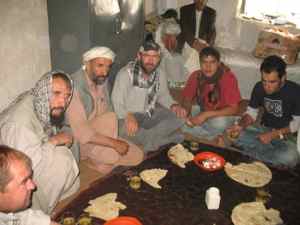
Robert Zuill (fourth from the left) breaking bread in Afghanistan
Q: What are some of your experiences in Afghanistan?
A: Late one night in a dark village we were trying to find a place to eat. We saw a man grilling lamb kabobs over a small coal burner.
We entered the building behind him and found a long, low room full of men sitting cross legged across from each other in rows on two raised platforms. Between the rows were long, plastic table cloths with bread and meat on them. Everyone looked like a mujahedeen.
Everyone turned to stare at us. I had a full beard and a Palestinian style head scarf, just like everyone else in our group. But the locals knew I was different. They were just not sure why. A rough looking character, stared at me with particular malevolence.
We removed our shoes and sat down cross-legged next to everyone else on top of one of the platforms. Naan bread was plopped onto the plastic tablecloth. Then came kabobs. No plates. No cutlery. You ate with your right hand, always using the bread to pick up the lamb. The meat was pretty good. But I wanted to get out of there fast.
Then my group decided to argue over the bill. The argument grew until one half of the room noisily supported us and the other half noisily supported the hotelier. I tried to pretend to be following the fun but I do not speak much Dari.
By this time some of the men were stretching out on the platforms to sleep. The place seemed to be a truck stop where the dining table also served as a communal bed.
Finally it was time to go. But I could not find my shoes. I had to look everywhere while everyone stared at me. Finally an old man tapped me on the shoulder and gave me my shoes back. Then the whole room erupted into laughter. The rough character who was staring at me earlier laughed the loudest and immediately shook my hand. It was so ridiculous I had to laugh too. Then our group shook hands with everyone in the room and we all said goodnight.
Q: You spoke a bit about the Embassies. What is the situation with foreigners in Afghanistan?
A: Kabul is a large, crowded city without the infrastructure to support the population. Despite the billions of dollars that have gone into Afghanistan, few of Kabul’s streets are paved. In fact, only about 10% of the country has electricity. Every afternoon as the wind picks up, the city is shrouded in dust storms. Many of the buildings are shattered by artillery and small arms fire. Some appear ready to collapse, but no one pays any attention.
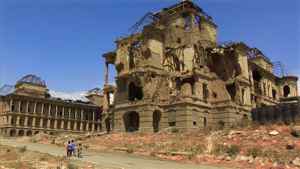
Former Presidential Palace
The embassies are entirely different. We were invited to the US Embassy’s July 4’th party. To get in you went past check points, tanks, and gun emplacements. But the party was great. There was a big pool, plenty of western food, stacks of refrigerated shipping containers, a variety of the good US beers (Sam Adams, Anchor Steam, Sierra Nevada, etc.). Fireworks were tastefully avoided. The band played Jimi Hendrix’s “The Star Spangled Banner”. The ambassador and his wife were extremely friendly and congenial. Every international worker in Kabul attended.
Another great party was thrown by a French NGO. At that party, all the food and booze was free, the music was loud, and there was a packed crowd of about 500 westerners there continuously for about 8 hours getting blind drunk and doing everything the Taliban dislike. Anybody could have tossed five or six grenades over the wall and there would have been a massacre. Several people I knew had been forbidden by their employers from attending the party for precisely this reason. But they all went anyway. The whole thing must have been paid for with donor money. Parties like that are not cheap in Afghanistan, or anywhere else, and that party gets thrown annually.
Meanwhile out in Kabul, all the streets around the embassies and important government buildings have been closed to traffic. Colossal traffic jams are the result as everyone gets diverted. One question I kept hearing was, “Why don’t they just move the embassies outside the city? Security will be easier and traffic will be better.”
Once I met a man on the streets of Kabul who seemed to be severely retarded. Some guards at a house nearby knew who he was and seemed to support him with enough money so he could survive as a homeless person in Kabul. The guards said the man was actually an Iraqi who had been brought there as a sort of mascot by some of the international forces when they transferred from Baghdad. The people he arrived with had left for home years before.

Biking through the streets of Kabul
A: On my last night in Kabul we had a big party in a bar named after the famous battle of Gandamak where the Afghans wiped out a very large British force. After the party, Shuja and I walked home through the dark streets of Kabul. This is the kind of thing you are warned never to do for obvious reasons. But we saw no one. The streets were wonderfully quiet. The greatest danger seemed to be falling down one of the many holes in Kabul’s roads. Occasionally an attack helicopter would clatter fast overhead with all lights out. It was like something out of the Arabian Nights with minarets outlined against the blue, star-filled Afghan sky.
One day in the Panjshir Valley the Afghan SESA engineers had to talk to some people in a Forward Operating Base. The entire solar crew was with us but only one person was allowed into the base which was only a few hundred yards by a few hundred yards and very heavily defended. After a while a woman from the US military came out and spoke to us through an interpreter explaining what village needed solar panels and some other technical points. None of us had had a shower or a change of clothes in five days and we were all dressed like Afghans. She had come out with no backup and was understandably a bit nervous. Then she started handing out bottled water and was completely amazed when three of us said “Thank you” in perfect English.
One of the best things I did in Afghanistan was to go with a donkey train way up into the mountains for a four day trip. We were carrying solar panels up to a clinic in a large valley with no road. It was a bit odd seeing one of the oldest forms of transport carrying super high-tech solar panels. But the villagers didn’t bat an eyelid. The Afghans seem to be very familiar with the wonders of solar power and they vastly prefer solar panels to diesel generators. Solar panels don’t require fuel which they can’t afford.
A French NGO installed thousands of diesel generators all over Afghanistan shortly after the invasion. They now sit idle. I spoke with a mullah in a small village and he showed me a brand new Perkins diesel covered with dust. “It worked for a month. Then we ran out of gas. That was years ago.” He said.
The Afghan mountains are beautiful, mysterious, and very dangerous. Massive water falls seem to cascade from the tops of high mountains far above you. The only explanation is that there is an even larger mountain out of sight above the first one.
But don’t even consider going hiking. During the war with the Russians, the Afghans ruled the hills and their enemy ruled the valley floors. So Afghan commanders like the famed Shah Ahmed Massoud shelled the Russians at will from the higher ground.
The Russian response was to fly over the mountains with hundreds of helicopters throwing thousands of land mines out the windows. No one has any idea how many mines are up there or where they might be. But there are a lot of them. The Afghans check for mine fields by driving herds of goats or sheep across unfamiliar ground. Often the result is mutton for dinner. But every year hundreds of shepherd men, women, and children are killed or get maimed by land mines.
Q: With a security situation that sounds unhinged why is water so important?
A: Kabul is spread out around several large, steep hills. Over thirty years of war, thousands of refugees have settled on the hills where nobody else wants to live. Unfortunately there are no municipal services on the hills. So while parents work, their children have to carry water uphill to their houses every day. This means the children miss school or don’t go to school at all. Cars have hit many children as they cross busy highways carrying loads of water.
But there is a simple solution to this problem. Water tanks can be installed on the tops of the hills with pipe systems to distribute the water downhill. Solar power can be used to pump the water up to the tanks. Solar power is a good choice because the refugees cannot afford diesel. So the project is more expensive at first, but it sustains itself.
While in Afghanistan I was working for a New Zealand firm called Sustainable Energy Services Afghanistan. Tony Woods who owns SESA said that they could install the tanks, pipes, and solar pumps for about $30,000 per system. One system could help about 200 people.
My proposal is to do a pilot project of one water system and use it as an example to raise money for more systems.
Q: How can people help?
A: Anyone who is interested in donating should visit his website for more information or email him at kwp@northrock.bm.
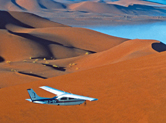 How sad would you be if you couldn’t fly around Namibia in a private plane for 12 days for just $7,995? Yeah I would be.
How sad would you be if you couldn’t fly around Namibia in a private plane for 12 days for just $7,995? Yeah I would be.


